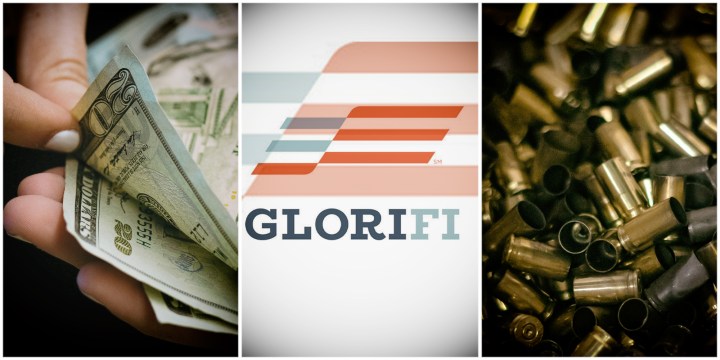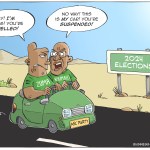AFTER THE BELL
Gun-cartridge credit cards — the tricky process of untangling politics and investing

Investing and politics, politics and investing; untangling the two can be extremely difficult.
The intersection between politics and investing is ever-present, but it came to mind today because a colleague pointed out a story in The Wall Street Journal about a banking startup in the US called GloriFi that has just gone horribly wrong.
The idea seemed like a winner: the founders wanted to leverage the increasingly divided US population and start an “anti-woke” bank, which (unlike those typical Wall Street banks which probably have, you know, Jews and other lefty-types in them) would be “Pro-America” and support important values like family, law enforcement, the right to bear arms, and golf. It’s probably the first time in history Wall Street bankers have been described as “too liberal”.
One of the original ideas was to make credit cards out of used gun cartridges. I am not making this up. The founders apparently raised around $50-million from A-list conservatives, like hedge fund manager Ken Griffin from Citadel and tech entrepreneur Peter Thiel. But within months, most of the money was gone and the original investors weren’t returning calls.
Practically crazy
One of the problems, it turns out, was that the founder, Toby Neugebauer, established the headquarters of the new bank in his huge house in Texas, which is modelled on the White House, the WSJ reports. Staffers said he was engaging and entertaining, but knew very little about banking. And he drank. A lot.
The credit cards made from gun cartridges turned out to be a case in point. Even if you don’t use actual spent cartridges, but just the material from which gun cartridges are made, they would interfere with electronic security chips and could be too thick to use in payment terminals. Sad!
It all sounds like a nightmare. I suspect that even if it’s a startup, if your boss — who enjoys an occasional tipple — suggests that everybody just moves into his huge mansion to start a bank, there are, just possibly, quite a few red flags waving that may demand your immediate attention.
The story, which no doubt will be the basis for a Netflix series, is an extreme case, but the fact is that it’s very difficult even in the best of circumstances to separate investing from politics. In some ways, you shouldn’t. Politics shapes the investment environment, and it’s a key variable in the state of the economy.
South Africans know this all too well. When you wake up one morning to discover a complete nonentity has just been made the finance minister, I can imagine singed carpets as investment managers sprint across the room to their terminals.
Visit Daily Maverick’s home page for more news, analysis and investigations
In a deeper sense, most investors I have come across are naturally conservative from a political point of view but often very open-minded and ambidextrous about history and society. Investors appreciate innovation, but prefer their politicians to be conservative.
It does stand to reason: conservatives favour lower tax rates, a smaller state and less onerous government “interference”. Yet, it’s not quite so simple. Investment managers, in my experience, are also pretty socially conscious and often support environmental, social and governance principles very strongly. That too makes sense: if you are investing cash on a long-term horizon for people who are going to need it in their retirement, preservation and risk mitigation are crucial concepts. You want the society to work in the broadest sense.
Personally, I tend to be very suspicious of so-called investors who wear their politics on their sleeves, of which South Africa has plenty. Just to take one example, in the post-war US, the GDP growth rate has been higher under Democratic presidents by 1.79 percentage points, the job creation rate has been higher, the unemployment rate lower, stock market returns much higher, government deficits lower and inflation lower.
This might surprise you: the president who can claim the highest percentage increase in employment in the post-war US is Joe Biden — and not just by a little bit. He was, of course, assisted by the Covid calamity, which had the effect of lowering the starting point, but still, no US president since Franklin Roosevelt has increased employment faster. That’s just a fact.
The comparative successes of the US economy under democratic presidents make for a remarkable list, but it’s more complicated.
Left vs right
Economic growth under centre-right governments in Europe has been substantially higher than under centre-left governments over the past century or so. There are many examples of spectacular economic collapses under left-wing governments in the developing world, with Zimbabwe and Venezuela being just the most recent examples. Yet, right-wing governments are not immune either, like many of the economically disastrous military dictatorships we have seen in Africa over the years.
I always think that politics is a broad lingua franca of a society, but there is actually little equivalence between politics and the specific and particular job of investment, which has its own — very different — set of dynamics. Investors, I suspect, are looking for effective governments, not just governments they personally agree with. Some investors like the idea of leveraging their politics into their investment strategy, and that can certainly appeal to clients. But generally, I think that’s a mistake.
The overlap between what is valuable and what is politically desirable is smaller than you might expect. Which doesn’t mean I think gun-cartridge credit cards are necessarily such a terrible idea. (Joking!) DM/BM


















Comments - Please login in order to comment.